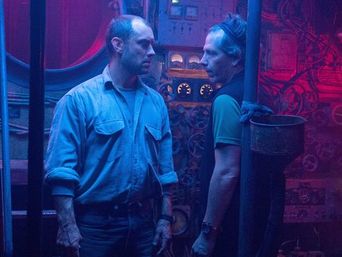
In Black Sea, Jude Law continues to demonstrate some mid-career range. In 2015, he's played a Bond-ian spy in, uh, Spy, and in Kevin MacDonald's claustrophobic thriller, he nails the polar opposite, a blue collar roughneck tasked with recovering sunken treasure. MacDonald uses Law and a gritty cast to great effect, recreating the dreary heist films of the 70's. Put a resentful Popeye Doyle in a submarine, and Black Sea stays mostly the same. Law's character, who often drives the action through sheer force of will, stands up nicely against that earlier incarnation of a man who sees what the job is, and drives steadfastly, if not recklessly, towards its completion.
Black Sea contains all the standard heist tropes of team assembly and plan-making, but its extra ingredient is a general, simmering anger at the higher-ups of society. As the film begins, Law's Robinson is being laid off from his long-time job at a salvage company, and he has plenty of compatriots going through the same thing. One of them tips him off to a plan that the company was unable to pull off, a sunken submarine in the eponymous body of water filled with gold that Stalin intended to transfer to Hitler in exchange for peace. Anxious for a big payday, and equally for a way to stick his thumb in his old company's eye, Robinson takes the job, funded by a mysterious money man and his associate Daniels (Scoot McNairy). From there, it's not difficult to find other men with similar impulses, and a mixed English and Russian crew strike out for their quarry.
Once the logistics and manpower are checked off, Black Sea joins the other taut thrillers set in submarines. That environment is inherently dramatic, and for my money, every film set in it has a baked-in degree of success. Several scenes of the sonarman plying his trade are excellent, as that's a task that is just arcane enough to inspire awe at its accomplishment while seeming knowable in its execution. Unwilling to settle for a straightforward heist, Dennis Kelly's script throws in several wrenches between factions of the crew. Daniels is forced to go along by his employer, and is decidedly out of place amongst these rough, burly, and bearded men. One short on his planned crew, Robinson also takes along the teenaged Tobin (Bobby Schofield) to serve as a gopher. Most interestingly, the always-welcome Ben Mendelsohn plays a significant role as the unhinged diver Fraser. Between Tobin's inexperience, Fraser's instability, and the ire that Daniels generates amongst the crew that see him as the upper-class avatar of all their problems, every action or conversation is fraught with tension.
In this potboiler, Law is utterly convincing as an alpha amongst alphas. It is vital that the film convey the strength required to keep the ship and its volatile crew on course, and Law has that gravitas, and then some. His Robinson rarely sets a foot out of place, though he does have his blind spots. His sense of fair play causes him to dictate that all crew members will receive an equal share, though it seems unfathomable to him that a crew member might conspire to reduce the crew's numbers and get a larger share. Robinson is so dead set against being like his former employers and their cost-cutting methods, that he forgets everyone's there for a mixture of greed and spite. Even when making short-sighted decisions like these, Robinson remains a man worth following. Creepy Mendelsohn and toady McNairy are square in their wheelhouses, and they do not disappoint. Schofield occupies a difficult space, as his existence makes up the most hackneyed portion of the film, though he does what he can to make Tobin a sympathetic character despite his occasional high-stakes clumsiness.
Black Sea is a highly-functional, compulsively watchable thriller built for an age of tenuous futures. In the annals of submarine films, The Hunt for Red October welcomes a compatriot with open arms. MacDonald, Kelly, and Law combine to make a resonant, adult film that leaves the viewer grateful for plentiful oxygen and personal space. B
 RSS Feed
RSS Feed